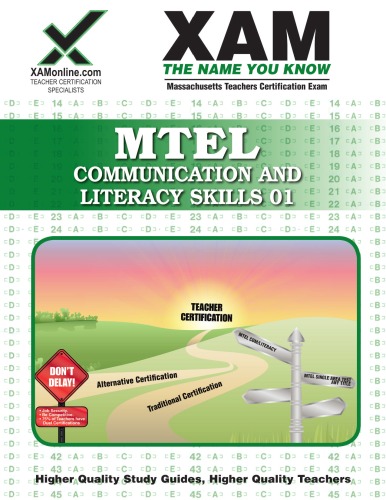

Most ebook files are in PDF format, so you can easily read them using various software such as Foxit Reader or directly on the Google Chrome browser.
Some ebook files are released by publishers in other formats such as .awz, .mobi, .epub, .fb2, etc. You may need to install specific software to read these formats on mobile/PC, such as Calibre.
Please read the tutorial at this link. https://ebooknice.com/page/post?id=faq
We offer FREE conversion to the popular formats you request; however, this may take some time. Therefore, right after payment, please email us, and we will try to provide the service as quickly as possible.
For some exceptional file formats or broken links (if any), please refrain from opening any disputes. Instead, email us first, and we will try to assist within a maximum of 6 hours.
EbookNice Team

Status:
Available5.0
8 reviews(Ebook) MTEL Communication and Literacy Skills 01 Teacher Certification 2nd Edition by Sharon Wynne - Ebook PDF Instant Download/Delivery: 9781607878254 ,1607878259
Full download (Ebook) MTEL Communication and Literacy Skills 01 Teacher Certification 2nd Edition after payment

Product details:
ISBN 10: 1607878259
ISBN 13: 9781607878254
Author: Sharon Wynne
"Massachusetts teachers certification exam"--Cover.
Includes bibliographical references (p. 230-231).
Description based on print version record.
(Ebook) MTEL Communication and Literacy Skills 01 Teacher Certification 2nd Edition Table of contents:
Skill 1.1 Using context clues to determine the meaning of a word with multiple meanings
Skill 1.2 Using the context of a paragraph or passage as a clue to the meaning of an unfamiliar or uncommon word or phrase
Skill 1.3 Determining the meaning of a figurative expression from its context in a paragraph or passage
Skill 2.2 Identifying the statement that best expresses the implied main idea of a paragraph or passage
Skill 2.3 Recognizing ideas that support, illustrate, or elaborate the main idea of a paragraph or passage
Skill 3.1 Recognizing a statement of a writer’s expressed or implied purpose for writing (e.g., to persuade, to describe)
Skill 3.2 Evaluating the appropriateness of written material for a specific purpose or audience
Skill 3.4 Using the content, word choice, and phrasing of a passage to determine a writer’s opinion or point of view
Skill 4.2 Recognizing cause-effect relationships
Skill 4.3 Analyzing relationships between ideas in opposition (e.g., pro and con)
Skill 4.4 Identifying a solution to a problem presented in a passage
Skill 4.5 Drawing conclusions inductively and deductively from information stated or implied in a passage
Skill 5.1 Analyzing the stated or implied assumptions on which the validity of an argument depends
Skill 5.2 Judging the relevance or importance of particular facts, examples, or graphic data to a writer’s argument
Skill 5.3 Evaluating the logic of a writer’s argument
Skill 5.4 Evaluating the validity of analogies
Skill 5.5 Distinguishing between fact and opinion
Skill 5.6 Assessing the credibility or objectivity of the writer or source of written material
Skill 6.1 Organizing information for study purposes (e.g., using note-taking skills, outlining, mapping the text)
Skill 6.2 Following written instruction or directions
Skill 6.3 Interpreting information presented in charts, graphs, or tables
Skill 6.4 Identifying a summary of a passage
Skill 7.2 Recognizing writing that is appropriate for a given audience and occasion
Skill 8.2 Recognizing revisions that improve the unity and focus of a piece of writing
Skill 8.3 Recognizing examples of well-developed writing
Skill 9.1 Recognizing methods of paragraph organization
Skill 9.2 Reorganizing sentences to improve coherence and the effective sequence of ideas
Skill 9.3 Recognizing the appropriate use of transitional words or phrases to convey text structure
Skill 10.1 Recognizing ineffective repetition and inefficiency in sentence construction
Skill 10.2 Identifying sentence fragments and run-on sentences
Skill 10.3 Identifying standard subject-verb agreement
Skill 10.4 Identifying standard placement of modifiers, parallel structure, and use of negatives in sentence formation
Skill 10.5 Recognizing imprecise and inappropriate word choice
Skill 11.1 Recognizing the standard use of verb forms
Skill 11.2 Recognizing the standard use of pronouns
Skill 11.3 Recognizing the standard formation and use of adverbs, adjectives, comparatives and superlatives, and plural and possessive forms of nouns
Skill 11.4 Recognizing standard punctuation
People also search for (Ebook) MTEL Communication and Literacy Skills 01 Teacher Certification 2nd Edition:
mtel communication and literacy skills practice test
mtel communication and literacy skills reading subtest
mtel communication and literacy skills reading subtest and writing subtest
mtel communication and literacy skills writing subtest
mtel communication and literacy skills (101/201)
Tags: Sharon Wynne, MTEL Communication, Literacy Skills, Teacher Certification